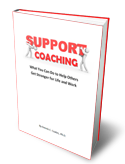Until 2004, that is, when we suffered a direct hit from Category 2 Hurricane Frances. Then, a couple weeks later, another direct hit by Category 3 Hurricane Jeanne. All I can say is, it’s amazing how adverse life can be sometimes.
I could also say, “It could have sucked worse.” Some of our friends lost their homes. Hotels on the beach were completely destroyed. We were “lucky.” We had flooding in the sun room and we had to have our roof replaced. We lost nine trees, including a 100-year-old oak tree in our front yard. Oh, and every plant on our property was blown over. The curbside pile of debris in front of our home was seven feet tall and 75 feet long.
Six months later, we had restored our home and property to better-than-before condition. However, we were changed. During the summer of 2005, as we watched reports of Katrina on TV, we wondered whether a hurricane that strong could hit our community. That was the year of so many hurricanes that they ran out of alphabet names. One of the hurricanes, Wilma, brought us 120 mph winds, equivalent to Category 2 winds. We lived only 6 feet above sea level. A major hurricane could wash our island away. There wouldn’t be anything left to rebuild on.
The question was, should we “head for the high ground,” as a friend of mine suggested? Or should we stay in Paradise? We knew that there would be no safe haven. Every place has both its wonders and its natural disasters. Pick your poison. And moving is an expensive, soul-crunching process. There’s a big difference between thinking about moving away and actually doing it. Vero Beach hadn’t had a hurricane in 100 years. Maybe it wouldn’t happen again. Maybe we wouldn’t like living somewhere else.
If we were to move, the best option for us was the Texas Hill Country. We had visited there before, and we knew it was beautiful. We’d be near family—a huge benefit. My wife’s parents were in their 80s. Her nieces and nephews were growing into adults, getting married and having kids. In Florida, we would miss most of that.
But if we were to move away, we would needed to act immediately. We knew people had left Florida because of the hurricanes. With less demand, property values had started to decline. The heated-up real estate bubble seemed ready to burst at any time. If that happened, it would be nearly impossible to sell our home.
The day that Kathleen said “It’s time” we put the home up for sale. We interviewed several realtors and picked the most action-oriented one. That evening, she briefed us on a five-day plan. The next day we started doing everything she told us to do. Before the week was out, we were on a plane to Texas to find out where we wanted to live.
And we got lucky. After about 15 open houses and over 100 walk-throughs, we had a buyer. The offer was 15% less than what we thought the house was worth, but we took it. We returned to the Hill Country to find our home, and we got lucky again. We found a better home than we thought we’d find in our target price range. And we got lucky a third time. We moved before the bubble burst, so our extra equity allowed us to live in a nicer home.
We closed on our sale, we packed, we drove to Texas and we closed on our new home. Our movers delayed bringing our belongings for almost a month, but we made lemonade. We repainted the interior.
In short, it was a difficult decision and a difficult move, but we’re glad we took initiative when we did. We’re a part of the family again. Our landscaping is finally looking beautiful. And we have lots of new friends.
Post by Dennis E. Coates, Ph.D., Copyright 2010. Building Personal Strength . (Photo of hurricane Isabel, courtesy of Mike Trenchard, Earth Sciences Image Analysis Laboratory, Johnson Space Center)
























